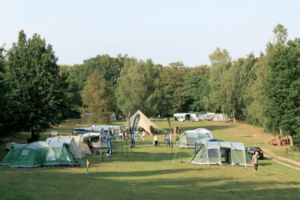News
Camping union warns new law could give Denmark a trailer park culture similar to the US
This article is more than 2 years old.
March 1 brought a reprieve for winter campers served an eviction notice in Køge, but will the proposed new rules be enough to save them next winter?

Year-round camping will soon be allowed in Denmark as part of a trial, but will is solve the problem? (photo: Dansk Camping Union)
March 1 marks the first day of the camping season in Denmark. During the winter there is a limit of 15-20 days (with permission from the municipality) on how long you can occupy a caravan or cabin at a site – no tents during the winter! – although a majority of MPs are believed to be in favour of a two-year trial, starting from 1 November 2023, which will allow full-term stays in 5 percent of all winter units.
The advent of March, along with the likely new law, could be regarded as good news by the 80 people who regard Corona Camping in Køge Municipality as their home.
They have been living all year round at Corona Camping, which was featured on the TV2 program ‘Trailerpark Danmark’, for many years, and efforts at the municipality to evict them have been ongoing since 2017.
Furthermore, the 80 campers – including some “vulnerable citizens”, according to TV2, who all have a residential address at Corona Camping – are currently occupying well in excess of 5 percent of Corona Camping’s winter units.
It is a problem that has gone away with the end of February, but battlelines will be redrawn on November 1, and the dispute will continue.
Union calls for clearer rules on camping
Dansk Camping Union (DCU) fears the new law could genuinely lead to the development of trailer parks similar to those seen in the US.
“We think camping is a form of holiday and leisure, and not a form of housing. There must be some very clear rules in this area,” DCU chair Anne-Vibeke Isaksen told TV2.
“Otherwise, we will have trailer parks and American conditions, and that is not something we want in the DCU.”
However, Susanne Farnø, the co-owner of Corona Camping, rejects the notion, pointing out that “not all trailer parks in the US are slums” and “that some people are better off here because they simply feel better here than they do in an apartment”.
However, she cautions: “No-one should ever be forced to live in a caravan. The municipality must not be able to use caravans as an outlet for citizens on the edge of society.”
Campsite co-owner rejects trailer park claims
Farnø is unsure whether the proposed new law will help her long-term residents as the 5 percent stipulation is very low.
“It’s a tiny door, but at least it is now ajar. The politicians have opened their eyes to the problem and are open to looking at other forms of living,” she said.
“We think instead that it should be up to the individual campsite owner to decide how many permanent residents they want.”
The Climate and Planning Committee at Køge Municipality would beg to differ, but so far it has not reported the residents to the police.










































